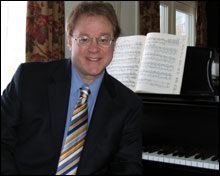The Boston Symphony Orchestra began the new year with one of its most disappointing concerts since music director James Levine took over. Guest conductor Kurt Masur paired Tan Dun’s Water Concerto: In Memory of Toru Takemitsu (1999), which he commissioned for the New York Philharmonic, and Anton Bruckner’s Seventh Symphony — hardly a compatible or illuminating juxtaposition. After hearing the Tan last year as part of a Takemitsu tribute by Gil Rose and the Boston Modern Orchestra Project, I couldn’t say the desire to experience it soon again was high on my list. It’s a shallow piece, three percussionists slapping and plunging various objects into deep, clear-plastic, electronically amplified “hemispherical water basins” — plish, plosh, drizzle, drip — with movie-melodrama accompaniment, in a pretentiously darkened hall. The orchestra and NY Phil principal percussionist Christopher Lamb, for whom the piece was commissioned (he also played it for BMOP), were expert, but the piece is all wet.
Masur’s Bruckner began buoyantly but never soared. The great slow movement seemed more flat exposition than a voyage of spiritual discovery. The Scherzo, if not exactly leaden, was too slow. On my night (Friday), the orchestra sounded tired and the final chord splattered, though the brass playing elsewhere (those wonderful Wagner tubas) was exciting. It felt like a very long evening.
The following week, Levine was back for a better but even longer evening, beginning with the world premiere of 40-year-old Boston-born Jonathan Dawe’s allegorical The Flowering Arts (a BSO 125th-anniversary commission originally scheduled for next year but finished in time to replace Leon Kirchner’s as yet unfinished commission). Dawe puts Baroque music (Marc-Antoine Charpentier’s 1685 opera/ballet Les arts florissants), with modern instruments imitating sackbuts, krummhorns, and recorders, through the wringer of multi-layered Ivesian cacophony. (A battery of contemporary percussion includes three anvils.) A student of Milton Babbitt, he mixes into his program note the creation of “fractals of fractals” with old-fashioned idealism. (“In worlds in which discord abounds, peace only truly triumphs with the support of creativity and imagination.”) “Peace” emerges from the discord in the form of floaty high strings and flutes and tintinnabulating glockenspiel and vibraphone. On a first hearing, I found passages attractive but felt I got the point after too few of the work’s 17 minutes.
Robert Schumann’s Fourth Symphony, a Levine specialty, sounded much more daringly original, with a slow introduction that combined majesty and sweetness and exhilarating fast movements palpitating with Roman-candle eruptions. (Three of the movements are marked “Lebhaft” — “lively.”)
Between 1991 and 2002, no one but Seiji Ozawa led the BSO in Hector Berlioz’s Symphonie fantastique — it was one of his calling cards. But Levine made it more than a showpiece, injecting it with both drama and nuance (I could really follow Berlioz’s crazed plot); and his refined sense of textural balances (especially in the slow unfolding of the pastoral “Scène aux champs”) allowed us to hear all the sonic collisions and evolutions. Even the “idée fixe” — the theme that represents the hero’s romantic obsession — sounded fresh and insinuating. There are more mysterious and evocative recorded performances (Otto Klemperer, Pierre Boulez), but I’ve never heard a more thrilling live one.
Last year, 16-year-old cellist Sebastian Bäverstam blew me away playing the “title role” of Richard Strauss’s Don Quixote with the New England Conservatory’s Youth Philharmonic Orchestra under Benjamin Zander on their tour of Venezuela and Brazil. He gave an ambitious recital for the Brookline Public Library’s free concert series, starting with a rich and scintillating performance of György Ligeti’s early (1948) Sonata for Solo Violoncello, which begins with a “dialogue” between reverberating pizzicatos and soulful, long-breathed folk melodies and ends with a Hungarian hoedown. Then, with pianist Constantine Finehouse, he took on two high points of 19th-century chamber music, Beethoven’s Sonata in A, Opus 69, and Brahms’s late Sonata in F, Opus 99. Finehouse was consistently too loud and uninflected, and at times his technique was a little rough; Baverstam, who played everything from memory, was both freer and more refined, insightful, and interior.
The Boston Early Music Festival Concerts brought back Italian viola da gamba virtuoso Paolo Pandolfo for a fascinating but not entirely satisfying recital at Cambridge’s First Congregational Church. Partly because the major works on the program were two J.S. Bach cello suites. Pandolfo strained to get the more muted, less flexible gamba to deliver the music’s familiar riches. The hollow acoustics of First Church didn’t help. The Fifth Suite, which opened the concert, sounded so disembodied, it was hard to hear details.
After intermission, Pandolfo played three actual gamba pieces by Carl Friedrich Abel, a friend of Bach’s son Johann Christian. Arpeggiata, with its rocking broken chords, is a haunting forerunner of contemporary minimalism. Adagio spins fanciful filigrees around a slow, songful line. Then Pandolfo zoomed into the breathless Allegro.